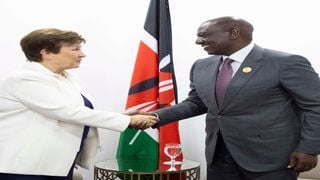
President William Ruto with the IMF Managing Director, Kristalina Georgieva. FILE PHOTO | PCS
|Business
Premium
IMF rescues Kenya from Sh300bn Eurobond scare
The International Monetary Fund (IMF) has moved to rescue Kenya from plunging into a financial crisis after the global lender confirmed that it was mobilising funds to help the country repay its $2 billion Eurobond maturing in June next year.
Besides approving an additional $938 million (Sh142.6 billion) in its sixth review under the Extended Fund Facility (EFF) and Extended Credit Facility (ECF), the IMF cited the “uncertainty” over Kenya’s ability to meet its June 2024 Eurobond obligation, as the main reason for its intervention.
Kenya, like many other frontier and emerging countries, has struggled to access the international capital markets, making it difficult to get funds for retiring the $2 billion (Sh304.4 billion) Eurobond borrowed nine years ago.
“Despite continued commitment to the implementation of the IMF-supported economic program which is broadly on track, uncertainty looms over Kenya’s effective access to international bond markets,” said the IMF in a press release following a staff mission to Nairobi during October 30 – November 15, 2023.
“This uncertainty is exerting substantial pressure on liquidity, primarily due to the sizeable Eurobond maturing in 2024. Against this backdrop, the authorities are actively mobilizing additional financing from their development partners, the IMF, and commercial sources while concurrently intensifying their efforts to enhance macroeconomic policies and implement structural reforms,” said the IMF.
To remain in the IMF’s good books, President William Ruto’s government has implemented a lot of the global financier’s conditions, including far-reaching tax measures such as the doubling of value-added tax (VAT), which have been blamed for the spike in the cost of living.
In Africa, the IMF and its sister Bretton Woods institution the World Bank, earned some infamy for the structural reforms in the late 1980s and early 1990s, with some analysts blaming them for increased unemployment and poverty levels.
According to David Ndii, who chairs President William Ruto’s Council of Economic Advisers, the country is likely to push for further resources from the multilateral lender beyond Kenya’s prescribed quota as a stop-gap measure in the event access to alternative financing remains constrained.
“We will be discussing exceptional access, likely at the 7th review, which entails accessing resources above the quota. The exceptional access is really insurance against future shocks,” Dr Ndii told the Business Daily on Wednesday.
Kenya, which issued its first Eurobond in 2014, remains exposed to the ever-evolving external shocks, including rising interest rates in advanced economies that have seen it stay out of the international capital markets and geo-political tensions that have pushed up the price of key raw materials, including fuel, fertiliser and food.
“Everybody thought that the prevailing global shocks would be short-term. Now the Fed (US Federal Reserve) is talking about keeping interest rates high for longer and while we had one war [Russia-Ukraine] we now have two [Israel-Hamas],” Dr Ndii added.
Earlier, he underpinned that Kenya had access to adequate resources from the IMF.
The IMF insists the economic programme, through which Kenya is expected to receive close to Sh400 billion by March 15, 2025, is aimed at spurring growth, achieving macro-economic stability and debt sustainability.
In his State of the Nation address last week, President Ruto disclosed that Kenya will pay back part of the Eurobond next month in what is aimed at calming a market that has been jittery over the country’s ability to meet its obligations next June.
Dr Ruto said at the joint sitting that the country will pay its first instalment of the Eurobond amounting to $300 million (Sh45.46 billion), having managed to mobilise the funds from some development partners.
“I can now state with confidence that we will and shall pay the debt that has become a source of much concern to citizens, markets and partners,” said the President in his State of the Nation address.
The assurance from the IMF offers a much-needed reprieve for Kenya which, besides grappling with a tight liquidity in the global financial market, has also seen its reserve of foreign currencies dwindle owing to poor export earnings against increased external debt service costs and elevated import prices.
A tight global financial market aggravated by the hiking of interest rates by the central banks in advanced economies has dimmed the prospects of Kenya raising much-needed dollars to refinance, and borrow to pay, the 2014 Eurobond, with some analysts fearing that Kenya might follow Ghana’s route by defaulting.
Last month CBK Governor Kamau Thugge revealed talks with the Trade & Development Bank and the African Export-Import Bank aimed at raising between $500 million (Sh74.64 billion) and $1 billion in commercial loans before the end of the year.
It is not clear how Kenya intends to partially repay the Eurobond, though some analysts say a buyback of the bonds might be on the table.
A buyback involves repurchasing the bond before maturity, which Kenya believes will allow the country to get a favourable price as yields on the Eurobond, which the country raised in 2014, have been falling.
Overseas investors lowered their risk assessment after the CBK outlined a plan to borrow up $1 billion to partly repay the maturing Eurobond.






